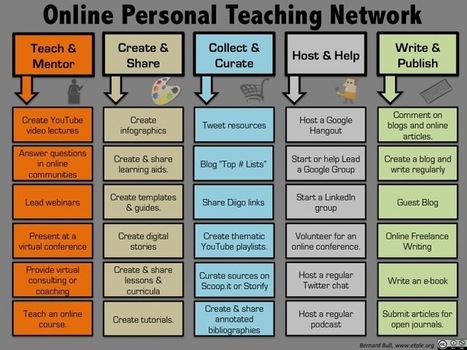Translate
Tuesday, 27 May 2014
Friday, 23 May 2014
Thursday, 15 May 2014
Edupreneurs: Could Teachers Become the Next Batch of Startup Entrepreneurs?
Edupreneurs: Could Teachers Become the Next Batch of Startup Entrepreneurs?
in http://www.bestmastersineducation.com/edupreneurs/

Source: BestMastersinEducation.com
in http://www.bestmastersineducation.com/edupreneurs/

Source: BestMastersinEducation.com
Edupreneurs: Could Teachers Become the Next Batch of Startup Entrepreneurs?
When comedian Rodney Dangerfield uttered the words, “I don’t get no respect,” millions of teachers and adjunct professors might have been nodding in agreement. According to a GEMS Foundation survey of 21 countries, Americans think of teachers at about the same level as librarians — meaning that they are not valued as highly as in other countries such as China, where they are perceived by over 33% of people as being at the same level as doctors. Only about 5% of Americans surveyed see teachers that way.
How Educators Can Become Edupreneurs
The EdTech (Educational Technology) market is growing, and what better place for those with existing teaching experience to seek extra work or a slight change of career? The first step is research: study the niches and opportunities, determine an area of interest based on experiences and skills. Finding mentors for an EdTech startup business is a bonus. Some thoughts on EdTech opportunities:
• Collaborate. Instead of going it alone, form an EdTech startup with other disenchanted educators.
• Repurpose courses. Take existing curriculum materials and repurpose it for online learning in the form of ebooks, webinars and self-study courses. If you have the online infrastructure, create them as MOOCs — Massive Open Online Courses. Just make sure you create original material for your courses and other learning materials.
• Build language learning apps. This is a popular EdTech niche, though some might feel it’s already getting overcrowded.
• Use gamification. Create Web and mobile learning apps that feel like games by implementing levels, goals, etc., and offers rewards and badges for accomplishments.
• Create an advanced remote tutoring platform which implements video, chat, and computer screen sharing where appropriate for a subject.
• Build better study and exam prep apps (mobile or Web).
• Develop EdTech data and analytics services. Startup:Education, founded by Facebook CEO Mark Zuckberg, provided $4M in seed round funding in Oct 2013 to Panaroma Education (panoramaed.com), which offers K-12 survey and analytics services.
• Report on developments in the Ed Tech market. For example, EdSurge.com raised $1.5M in Feb 2014 for their Ed Tech coverage, reminiscent of Consumer Reports.
• Create a security/ authorization service for online test-taking.
• Consult. Devise credentialing and accreditation strategies for online courses and offer consulting services to online learning sites.
• Cater to other edupreneurs by offering services related to EdTech startups. For example, Dev Bootcamp teaches people with no computer programming experience how to code, in a multi-week course that costs $12.2K. Although Dev Bootcamp is geared towards people who want to start out with coding jobs, many intend to launch their own startup, a similar service for edupreneurs has potential, when the market can support it.
• Go beyond your borders. There’s need for a shift in education beyond the United States, and there are even a few “global education standards” initiatives.
• Collaborate. Instead of going it alone, form an EdTech startup with other disenchanted educators.
• Repurpose courses. Take existing curriculum materials and repurpose it for online learning in the form of ebooks, webinars and self-study courses. If you have the online infrastructure, create them as MOOCs — Massive Open Online Courses. Just make sure you create original material for your courses and other learning materials.
• Build language learning apps. This is a popular EdTech niche, though some might feel it’s already getting overcrowded.
• Use gamification. Create Web and mobile learning apps that feel like games by implementing levels, goals, etc., and offers rewards and badges for accomplishments.
• Create an advanced remote tutoring platform which implements video, chat, and computer screen sharing where appropriate for a subject.
• Build better study and exam prep apps (mobile or Web).
• Develop EdTech data and analytics services. Startup:Education, founded by Facebook CEO Mark Zuckberg, provided $4M in seed round funding in Oct 2013 to Panaroma Education (panoramaed.com), which offers K-12 survey and analytics services.
• Report on developments in the Ed Tech market. For example, EdSurge.com raised $1.5M in Feb 2014 for their Ed Tech coverage, reminiscent of Consumer Reports.
• Create a security/ authorization service for online test-taking.
• Consult. Devise credentialing and accreditation strategies for online courses and offer consulting services to online learning sites.
• Cater to other edupreneurs by offering services related to EdTech startups. For example, Dev Bootcamp teaches people with no computer programming experience how to code, in a multi-week course that costs $12.2K. Although Dev Bootcamp is geared towards people who want to start out with coding jobs, many intend to launch their own startup, a similar service for edupreneurs has potential, when the market can support it.
• Go beyond your borders. There’s need for a shift in education beyond the United States, and there are even a few “global education standards” initiatives.
Don’t focus on taking students away from traditional education. Focus on filling the gaps. It’s not just young students who want to learn; so do many who’ve been in the workforce for a few or even many years. The average edupreneur’s efforts might not make them a billionaire like Peter V. Sperling (Forbes 2014 ranking #1284, worth $1.3B), who made his fortunes partly from founding Apollo Group (an educational services company) and co-founding CallWave, Inc. (now known as FuzeBox, Inc. — an Internet and mobile communications service provider). However, filling a demand in EdTech increases the chances of not having to live off of food stamps or hold down a second job in addition to teaching.
Wednesday, 14 May 2014
Thursday, 8 May 2014
Google Debuts Classroom, An Education Platform For Teacher-Student Communication | TechCrunch
Google is tackling the persistent need in education for better software with Classroom, a new tool launching in beta preview to help teachers make, collect and track student assignments, and to help them better communicate with their classes.


The Classroom app is part of Google’s Apps for Education lineup of products, and it uses Docs, Drive and Gmail to make assignment creation and tracking easier than when you’d do those things manually. Basically, Google has taken a process that many were already using and streamlined it to make it more useful. Google has a huge advantage over other startups trying to do the same as a result; there’s an immense built-in existing population of users to get onboard
Tuesday, 6 May 2014
“Competency-Based Teacher Preparation & Professional Development,” infographic
This infographic, “Competency-Based Teacher Preparation & Professional Development,” outlines how the role of teachers is changing amid broader shifts to personalized, blended and Deeper Learning. It previews the topics that will be covered in the paper “Preparing Teachers for Deeper Learning: Competency-Based Teacher Preparation and Development” that Digital Promise and Getting Smart will release this Thursday, May 1, 2014.

Friday, 2 May 2014
This Is Your Brain on Great Literature | TIME.com
This Is Your Brain on Great Literature | TIME.com

by
Annie Murphy Paul @anniemurphypaul
April 26, 2014

by
Annie Murphy Paul @anniemurphypaul
April 26, 2014
Research shows that reading rich narratives and metaphors activates areas of our brain outside of language, and frequent fiction reading is correlated with empathy.
Read more in
'via Blog this'
Subscribe to:
Comments (Atom)




